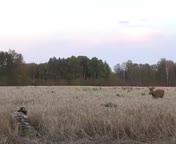
Hunting Deer by Calling — A Tactical and Seasonal Art Now in Full Swing Across Russia Calling deer — or “hunting by lure” — is a highly skilled and strategic method in which the hunter mimics the vocalizations of either a rival male (buck) or a receptive female (doe) to provoke a response from a wild deer. This technique is especially effective during the rut — the annual mating season — when bucks are driven by hormones, territorial instincts, and competition to seek out rivals or mates. A well-executed call can trigger curiosity, aggression, or desire in a stag, drawing it within range of the hunter’s position. Hunters use specialized tools such as grunt tubes, bleat calls, or even handmade wooden or plastic callers to replicate the nuanced sounds of deer — from deep, guttural challenge grunts to soft, alluring doe bleats. This method requires not only technical skill in sound imitation but also deep knowledge of deer behavior, wind direction, terrain, and patience. A single misplaced step or poorly timed call can alert the animal and ruin the entire setup. Success often depends on the hunter’s ability to read the landscape and anticipate deer movement — turning the hunt into a psychological game as much as a physical one. Deer Calling in Russia: Tradition Meets Modern Tactics In Russia, deer calling is a widely practiced and respected hunting technique, particularly for species such as the red deer (благородный олень), roe deer (косуля), and Siberian wapiti (марал). Across the vast expanses of Russia — from the forests of the Urals and Siberia to the woodlands of Central Russia and the Far East — hunters have long relied on calling as a core method during the rutting season. The rut for most deer species in Russia typically begins in late September and peaks through October and early November, depending on the region and local climate. As autumn deepens and temperatures drop, stags become increasingly vocal and combative, making them more responsive to calls. In many regions — including Krasnoyarsk Krai, Altai, Tver, Yaroslavl, and the Republic of Buryatia — the official hunting season for deer via calling methods has already begun, with regional hunting authorities issuing permits and setting strict quotas to ensure sustainable populations. Russian hunters often combine traditional knowledge — passed down through generations — with modern equipment. While some still use hand-carved wooden calls or simply their own voice to mimic deer sounds, others now employ electronic callers or high-fidelity mouth-blown devices imported from Europe or North America. However, regulations in many Russian regions prohibit the use of electronic callers to preserve the “fair chase” principle and prevent overharvesting. Season Is Now Open — But Rules Apply Across numerous federal subjects of Russia, the 2024 deer calling season is officially underway. Hunters must possess valid licenses, adhere to regional bag limits, and hunt only during designated hours and zones. Many regions require hunters to report their harvest within 24–48 hours and may restrict calling to certain dates within the broader hunting season to avoid disturbing deer outside peak rutting activity. Local hunting societies and wildlife departments often organize guided calling hunts or educational seminars to teach newcomers the art of deer vocalization and ethical hunting practices. In recent years, there’s also been a growing emphasis on conservation — ensuring that while the thrill of calling a majestic stag out of the forest remains alive, it doesn’t come at the cost of ecological balance. In Summary: Deer calling is more than just a hunting tactic — it’s an immersive experience that connects the hunter with the rhythms of nature, the behavior of wild animals, and the ancient traditions of the chase. As the rut intensifies across Russia’s forests and fields, hunters are heading into the woods, calls in hand, ready to test their skill against some of the country’s most iconic game animals. Whether you’re a seasoned caller or a curious beginner, now is the time — but always remember: respect the animal, respect the law, and respect the wild. The season has begun. The forest is listening.
Post: 23 September 00:55


